
39
FOOD
making carbs count
thicker, unstrained version of
yogurt that is uniquely smooth
and tangy.
Gut feel
Beyond national preferences and
tastes, yogurt is widely celebrated for
its numerous health properties. Rich
in essential nutrients like calcium,
protein, and probiotics, yogurt
offers myriad benefits for overall
health and well-being. Probiotics, in
particular, are live micro-organisms
that promote gut health and aid
digestion, potentially reducing
the risk of gastrointestinal issues
and boosting the immune system.
Additionally, yogurt's calcium content
supports bone health and may help
prevent osteoporosis, making it
a valuable addition to a balanced
diet. Yogurt nutrition varies widely
depending on the type. Yogurt made
from skimmed milk is considered
low fat and a healthy choice. Adding
bacterial culture to milk thickens the
mixture and adds a tangy taste. Fruit
and flavoured yogurts may taste nice
but watch out for additives and high
sugar content.
Big in the Balkans
From a healthy breakfast dish,
through to savoury dishes and sweet
treats, yogurt adds flavour and
creamy texture to many recipes. One
country that uses yogurt to the full
is Turkey, where an average family of
four can consume up to five kilos of
yogurt per week. Yogurt is present
at nearly every meal, sometimes in
multiple dishes, as a snack, dessert,
and even as a drink. It's often used
as a base for grilled meats, as a side
or accompaniment to vegetables
or stews or in soups. It is drunk as
'ayran' a refreshing salty drink made
with diluted yogurt. South Asian
cooking utilizes yogurt in curries and
marinades for tenderizing meat and
flavour enhancement. In desserts,
yogurt shines in recipes such as
smoothies, cheesecakes, and parfaits,
offering a healthier alternative and
is a go-to snack or healthy breakfast
when topped with nuts and honey.
Fruit yogurts can be frozen as an
alternative to ice lollies.
Appreciate yogurt
In recent years, the popularity of
yogurt has surged, leading to a
plethora of innovative products
catering to diverse tastes and dietary
preferences. Although traditional
yogurt isn't suitable for people with
milk allergies, plant-based yogurts
made from alternatives like soy,
almond, and coconut have gained
traction among vegan and lactoseintolerant
consumers, offering a
dairy-free option with comparable
taste and texture. Additionally,
flavoured yogurts infused with fruits,
honey, and spices appeal to those
seeking indulgent yet nutritious
snack options. The market for yogurt
is expected to grow in the future
as products develop and spread to
new markets.
Benefits of yogurt
Yogurt contains vitamins and minerals like calcium,
phosphorus, potassium, and folate. It's also rich in
protein. Eating yogurt helps the body to feel fuller
throughout the day and is a useful addition to
weight control.
Digestive Health
Many types of yogurt contain probiotics, beneficial
bacteria that improve gut health. People with irritable
bowel syndrome (IBS) may experience improved
symptoms when they eat yogurt regularly. Regular
consumption of yogurt may also relieve symptoms of
chronic diarrhoea or constipation.
Osteoporosis and bone health
Yogurt is rich in calcium, essential for healthy bones
and teeth. Eating foods high in calcium is important
to strengthen your bones and reduce the risk of
osteoporosis. Yogurt may be fortified with vitamin D
which helps the body absorb calcium. It also improves
immune health and reduces the risk of heart disease.
Blood pressure
Eating yogurt regularly may improve heart health and
lower blood pressure. Most types of yogurt contain
B vitamins like vitamin B12 and vitamin B2 that
protect against heart disease. Yogurt also contains
phosphorus, magnesium, and potassium which help to
regulate blood pressure and metabolism.
Immune health
Yogurt contains probiotics that may strengthen the
immune system by reducing inflammation. Chronic
inflammation is linked to several health conditions
and infections.
Nutrition
A typical 100g portion of plain
semi-skimmed yogurt contains:
Calories: 81kcal;
Fat: 4g;
Carbs: 7g;
Protein: 5g;
Salt: 0.18g.